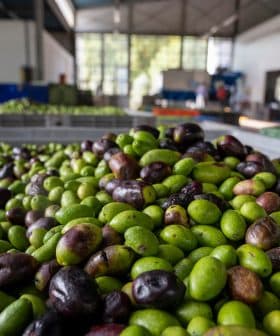 5.8K reads
5.8K readsHealth
Phenols More Important than MUFA Content for Extra Virgin Olive Oil Health Benefits, Research Suggests

A research review published in Nutrients confirmed that phenolic compounds in extra virgin olive oil are responsible for its unique health benefits, such as improving risk factors for chronic diseases. The review found that extra virgin olive oil is superior to other oils and non-extra virgin olive oil in decreasing blood pressure, LDL‑c, and blood glucose, while increasing HDL‑c and improving insulin sensitivity. The researchers hope these findings will inform public health policy and encourage consumers to choose extra virgin olive oil with a high phenol content for maximum health benefits.
A research review published in the scientific journal Nutrients confirms that phenolic compounds play a critical role in the health benefits associated with extra virgin olive oil that are not associated with other olive oil grades.
“The single most important thing to understand is that extra virgin olive oil is a unique food,” Mary Flynn, the lead author and an associate professor of medicine at Brown University, told Olive Oil Times.
This review indicates that approximately two tablespoons per day for extra virgin olive oil can improve a range of chronic disease risk factors in as little as three weeks.
“Compared to other oils, refined and non-extra virgin olive oil, or low-fat diet, daily use will improve several risk factors for chronic diseases, such as decreasing blood pressure, blood glucose, oxidation, and LDL and increasing HDL,” she added. “There is no other food, or medicine for that matter, that can improve such a range of risk factors.”
The researchers conducted a systematic review of studies published between 2000 and 2003 that compared extra virgin olive oil to low-fat diets, other oils and oils listed as ‘olive oils’ in the studies.
See Also:Health NewsThe narrative review systematically summarized the latest evidence on the protective effects of extra virgin olive oil on disease risk factors.
A criterion included in this review was that the study had to state extra virgin olive oil was used. Most of the published studies provided limited information on the extra virgin olive oil used. Of 281 retrieved articles, 34 articles fulfilled the inclusion criteria for the study.
“Based on current testing in most countries, an oil could meet a standard for ‘extra virgin,’ but it might not have phenols, and it is the phenols that provide the health benefits,“ Flynn said.
Flynn, who is also the founder of The Olive Oil Health Initiative of the Miriam Hospital, added that one of the goals of the research was to separate olive oil’s health benefits associated with phenolic compounds and those that may come from its high content of monounsaturated fatty acids.
“I find it very hard to believe that there are still people who think it is the monounsaturated fat content that provides the health benefits,” she said. “While there are no studies that support monounsaturated fats providing any benefits, there are many studies, some of which are in our review, that clearly show the [monounsaturated fatty acid] content is not the reason for health benefits.
“If it were, then both refined olive oil and canola oil would have health benefits, and they do not,” Flynn added.
Catherine Itsiopoulos, a co-author and professor at RMIT University in Australia, added that extra virgin olive oil is the keystone ingredient behind the health benefits associated with the Mediterranean diet.
“Extra virgin olive oil is one of the most important staples and a highly ranked distinctive ingredient of a traditional Mediterranean diet,” she told Olive Oil Times. “Our study shows that extra virgin olive oil, due to its rich source of polyphenols with anti-inflammatory and anti-oxidant potential, confers these health benefits and not just any type of olive oil.”
The researchers found extra virgin olive oil to be superior for decreasing blood pressure, LDL‑c, LDL oxidation, fasting blood glucose, and improving insulin sensitivity. Extra virgin olive oil also was determined to increase HDL‑c and improve HDL function.
“One of the more interesting findings was evidence of a distinct advantage of extra virgin olive oil for weight loss,” said Flynn.
“More research is needed to better understand which phenols are most protective and the amount of phenol needed in the olive oil to see the benefit,” she added.
In the meantime, the researchers hope these findings can help inform public health policy surrounding nutrition, which they believe to be outdated.
“I have been researching oil for the past 25 years,” Flynn said. “I’ve long been frustrated that health guidelines around the world do not distinguish the different types of oils.”
“Extra virgin olive oil is the juice of the olive and provides unique health benefits, especially compared to other oils,” she added. “The consumer needs to know they are using extra virgin olive oil that has health benefits, meaning it has at least 150 milligrams per deciliter of total phenols. Simply passing the chemical tests is not sufficient.”
Itsiopoulos said more work also needs to be done to dispel common myths about cooking with extra virgin olive oil.
“Extra virgin olive oil, due to its high antioxidant nutrient content, is highly stable during cooking, dispelling the myth that you cannot fry with extra virgin olive oil,” she said.
Despite the work that still needs to be done, both researchers said the review gives consumers plenty of reasons to prefer extra virgin olive oil over other grades of olive oil and cooking oils.
“This review indicates that approximately two tablespoons per day for extra virgin olive oil can improve a range of chronic disease risk factors in as little as three weeks,” Flynn said.
From olive oil producers, Flynn would like to see phenol content featured prominently on labeling and websites. The phenol content of olive oil is highest when first produced. Fresher virgin olive oil has a higher phenol content and therefore offers more health benefits.
She added that producers should also mention harvest dates on their olive oils and specify the amount of time from the harvest to the transformation process. This information would help consumers know which companies are producing the freshest olive oil with maximum health benefits.
“In many food-based dietary guidelines around the world, extra virgin olive oil is categorized in the oils, spreads and added fats section with the recommendation to consume sparingly,” Itsiopoulos added. “Given the evidence on the health benefits of extra virgin olive oil as presented in this paper, its place in food pyramids or plate models needs to be more prominent.”
Looking ahead at future studies, Flynn said more research into the relationship between extra virgin olive oil consumption and type 2 diabetes should be done.
“I was surprised how few studies there are testing the benefits of extra virgin olive oil for type 2 diabetics,” she said. “Studies have shown that lifestyle changes have more benefits for type 2 diabetics compared to medications.”
“We reviewed some studies showing extra virgin olive oil can improve insulin resistance (that is, the ability of insulin to store nutrients including glucose), and insulin resistance is the root cause of type 2 diabetes and metabolic syndrome,” Flynn added. “If more studies could confirm this finding, that would be very important information.”
Flynn predicts future studies could “test how quickly daily use of extra virgin olive oil could improve blood glucose control.”
“Based on the currently available studies, it is likely two tablespoons per day in as little as three weeks, but future studies could examine if the benefits increase over time,” she concluded.









